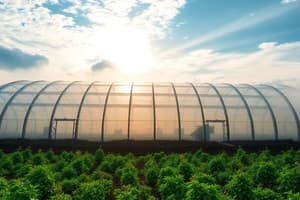Podcast
Questions and Answers
Which gas constitutes the largest percentage of Earth's atmosphere?
Which gas constitutes the largest percentage of Earth's atmosphere?
- Argon
- Carbon Dioxide
- Oxygen
- Nitrogen (correct)
In which atmospheric layer does the majority of weather phenomena occur?
In which atmospheric layer does the majority of weather phenomena occur?
- Stratosphere
- Troposphere (correct)
- Mesosphere
- Thermosphere
Commercial airplanes often fly in the lower stratosphere primarily to avoid what?
Commercial airplanes often fly in the lower stratosphere primarily to avoid what?
- Ozone layer concentration
- Extreme temperature variations
- Weather and turbulence (correct)
- Meteors and space debris
The International Space Station orbits Earth within which atmospheric layer?
The International Space Station orbits Earth within which atmospheric layer?
Which atmospheric layer is directly adjacent to outer space?
Which atmospheric layer is directly adjacent to outer space?
Which gas constitutes the largest percentage by volume in Earth's atmosphere?
Which gas constitutes the largest percentage by volume in Earth's atmosphere?
The ozone layer, crucial for filtering ultraviolet radiation, is primarily located in which atmospheric layer (not mentioned in text, infer from function)?
The ozone layer, crucial for filtering ultraviolet radiation, is primarily located in which atmospheric layer (not mentioned in text, infer from function)?
Which of the following is NOT identified as a primary greenhouse gas contributing to Earth's greenhouse effect?
Which of the following is NOT identified as a primary greenhouse gas contributing to Earth's greenhouse effect?
What is the primary effect of greenhouse gases on incoming sunlight and outgoing infrared light?
What is the primary effect of greenhouse gases on incoming sunlight and outgoing infrared light?
The Montreal Protocol, mentioned in the context of ozone layer recovery, primarily aimed to ban which category of substances?
The Montreal Protocol, mentioned in the context of ozone layer recovery, primarily aimed to ban which category of substances?
Flashcards
Ozone layer
Ozone layer
A layer in the Earth's atmosphere that absorbs most of the harmful ultraviolet (UV) radiation from the sun.
Greenhouse gases
Greenhouse gases
Molecules in the atmosphere that trap infrared radiation, regulating Earth's temperature.
Ozone (O3)
Ozone (O3)
A pale blue gas in the stratosphere that absorbs UV radiation, protecting life on Earth.
Greenhouse effect
Greenhouse effect
Signup and view all the flashcards
Global warming
Global warming
Signup and view all the flashcards
Troposphere
Troposphere
Signup and view all the flashcards
Stratosphere
Stratosphere
Signup and view all the flashcards
Mesosphere
Mesosphere
Signup and view all the flashcards
Thermosphere
Thermosphere
Signup and view all the flashcards
Exosphere
Exosphere
Signup and view all the flashcards
Study Notes
Atmospheric Structure
- Earth's atmosphere is a thin layer of gases surrounding the planet, held by gravity.
- It extends approximately 300 miles from Earth's surface.
- Divided into five layers: troposphere, stratosphere, mesosphere, thermosphere, and exosphere.
- Each layer has unique characteristics in terms of density, temperature, and processes.
Atmospheric Layers & Characteristics
- Troposphere (0-7.5 miles): Lowest layer, densest, contains 99% of atmospheric water vapor, weather occurs here, where life resides.
- Stratosphere (7.5-31 miles): Contains the ozone layer, commercial jets fly here, above clouds and weather.
- Mesosphere (31-50 miles): Coldest layer, burns up meteors, some rockets/aircraft can reach this.
- Thermosphere (50-440 miles): Low density, no clouds/water vapor, International Space Station orbits here.
- Exosphere (440-6,200 miles): Atmosphere merges with outer space, particles are lost to space, majority of Earth's satellites orbit here.
- Note: The thermosphere and exosphere are sometimes considered part of outer space, rather than atmosphere. Most scientists define the atmosphere as the first 100 km (62 miles) of gases.
Atmospheric Gases & Composition
- Key gases by percentage (by volume):
- Nitrogen (N2): 78.08%
- Oxygen (O2): 20.95%
- Water vapor (H2O): 0.4% (variable)
- Argon (Ar): 0.93%
- Carbon dioxide (CO2): 0.04%
- Trace gases (others): <0.000004% to about 0.002%
- Together, nitrogen and oxygen account for almost 99% of the atmosphere.
Importance of the Atmosphere
- Essential for life: Enables respiration and photosynthesis.
- Ozone Layer: Absorbs most harmful UV radiation from the Sun, preventing damage to plants, animals, and humans.
- Greenhouse Effect: Keeps Earth's temperature within a habitable range.
- Greenhouse gases (GHGs): Trap outgoing infrared radiation, keeping Earth warm. The main GHGs are carbon dioxide, methane, and water vapor.
- Human's impact: Burning fossil fuels has significantly increased carbon dioxide levels, leading to a potential rise in Earth's temperature and climate change.
Studying That Suits You
Use AI to generate personalized quizzes and flashcards to suit your learning preferences.





